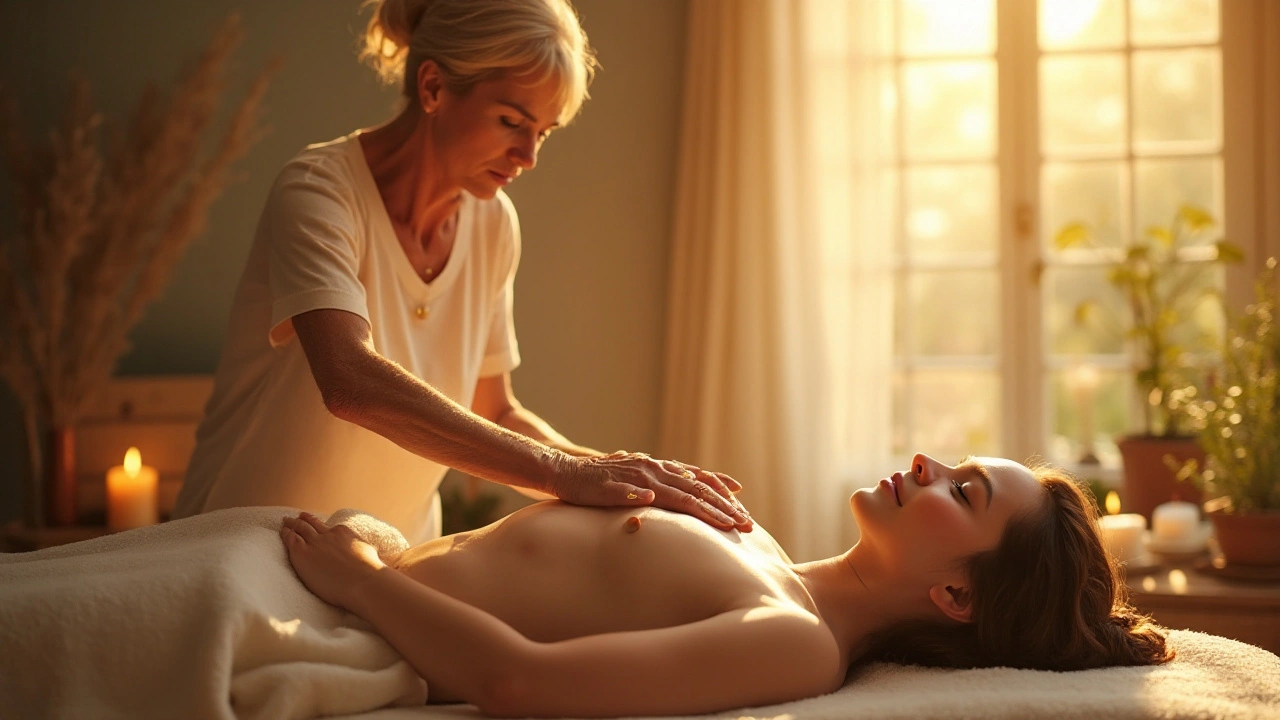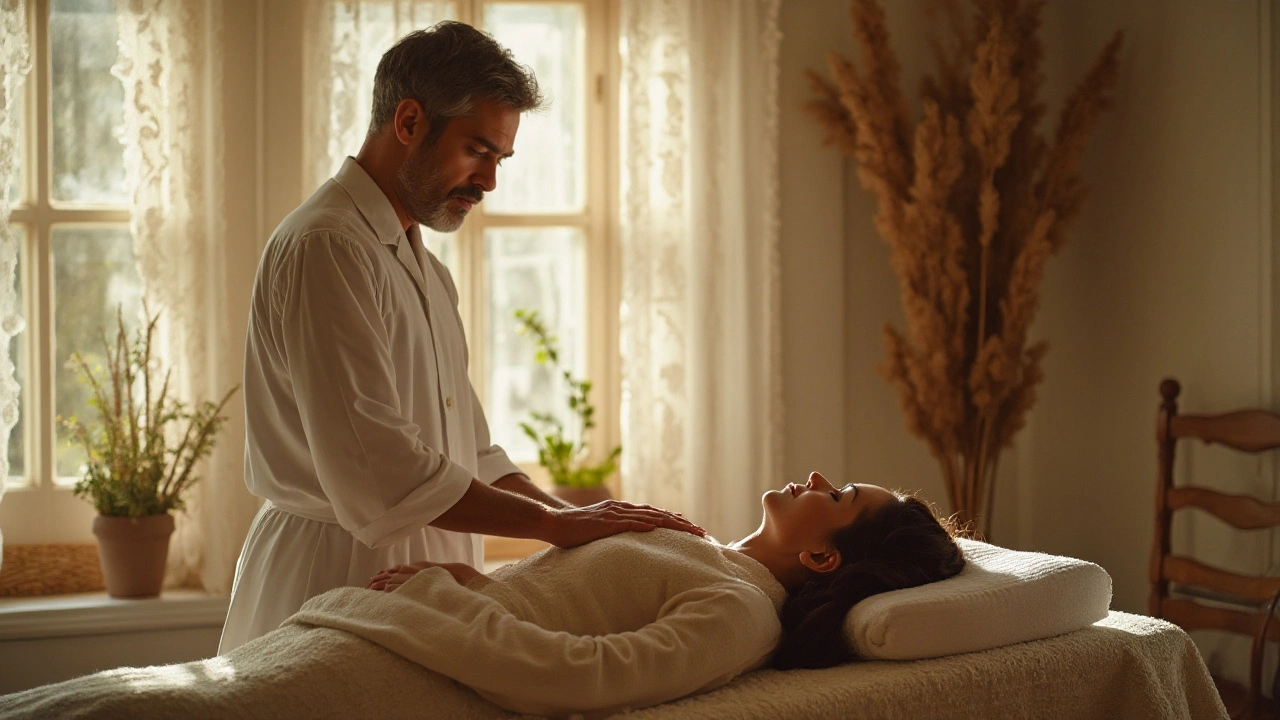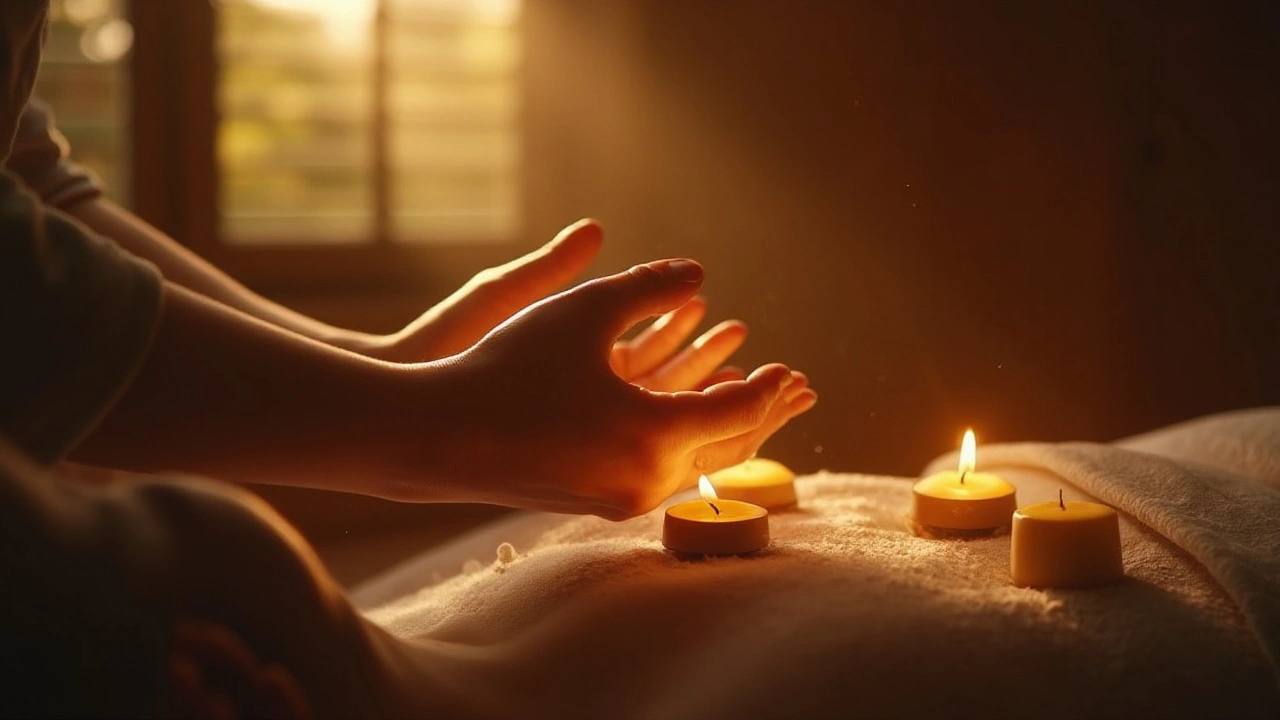Unlocking the Healing Power of Reiki Massage Therapy
 Jan, 2 2025
Jan, 2 2025
Imagine a practice that marries the ancient art of Reiki with the calming touch of massage therapy. Reiki massage therapy offers just that—a serene fusion designed to unlock your body's innate ability to heal. In today's fast-paced world, stress weighs heavily on many shoulders, literally and figuratively. This therapy provides an inviting respite, offering more than just physical relaxation. It aims to bring emotional tranquility and energy balance.
At the heart of this practice lies the ancient Reiki tradition. Developed in Japan, Reiki focuses on the transfer of universal energy from practitioner to patient. This energy exchange seeks to flow unimpeded through the body, alleviating blockages and restoring natural harmony. When combined with massage, Reiki can address physical tensions and emotional stresses with a uniquely gentle touch.
For those curious about diving deeper into the benefits of Reiki massage, it's essential to understand how it works and what you can expect from a session. From improving sleep and mood to aiding in chronic pain relief, the therapeutic effects of this practice reach beyond the surface. Whether you’re seeking relief from the day-to-day pressures, recovering from an injury, or striving to unveil a more centered self, Reiki massage offers a path worth exploring.
- Origins of Reiki Massage
- How Reiki Energy Healing Works
- Benefits of Reiki Massage Therapy
- The Experience of a Reiki Session
- Tips for Choosing a Reiki Practitioner
Origins of Reiki Massage
To truly understand the significance of Reiki massage, it's essential to journey back to the early 20th century, where its roots were planted in Japan. The origins of Reiki trace back to a spiritual teacher named Mikao Usui, who developed the practice after a profound meditation experience on Mount Kurama in 1922. Mikao Usui's dedication to understanding ancient healing systems culminated in the method we know today as Reiki, a term that combines the Japanese words 'rei,' meaning universal, and 'ki,' meaning life energy. This practice was centered around the belief that channeling universal energy can promote healing and balance across the body.
As Usui's teachings spread across Japan, Reiki's transformative power captured the interest of many. One notable student, Chujiro Hayashi, a naval officer and Usui's disciple, played a crucial role in preserving and expanding the practice. He compiled much of Usui's methods into a structured form, creating a curriculum that included specific hand positions and principles adaptable to healing various ailments. This meticulous work ensured that Reiki's essence was preserved even as it began to reach Western shores in the mid-1930s.
"The practice of Reiki is a subtle path to health, but its power lies not just in its simplicity, but in its deep connection to life itself," Hayashi is often remembered to have said.
Reiki's journey to the West was primarily through Hawayo Takata, a Japanese-American woman who brought the practice to the United States in the late 1930s after experiencing its healing effects in a Tokyo clinic. Overcoming significant personal health issues, Takata returned to Hawaii determined to share Reiki’s gifts. Through her rigorous teaching and adaptation to Western cultural sensibilities, she facilitated the natural evolution of the practice. As Reiki's popularity grew, the idea of combining it with massage therapy emerged. Practitioners recognized that the soothing touch of massage could enhance Reiki's energy healing, creating what we now embrace as Reiki massage therapy.
Today's Reiki massage is cherished by millions seeking both physical relief and emotional balance. Tracing its ancient roots provides not only context but also a deeper appreciation of this holistic practice. As the world of wellness continuously evolves, Reiki massage stands as a testament to the enduring spirit of healing innovations. By harmoniously blending traditional Reiki practices with intuitive massage approaches, the therapy underscores a universal truth: the pursuit of health is as timeless as the human experience itself.
How Reiki Energy Healing Works
The essence of Reiki lies in its profound ability to channel life's unseen forces—often described as universal life energy—to support healing in both body and mind. At its core, Reiki is an energy healing practice that originated in Japan in the early 20th century, attributed to Dr. Mikao Usui. This ancient method involves a practitioner gently placing their hands just above or lightly touching the client's body. Through this technique, it is believed that the practitioner's hands serve as conduits for energy to flow into the recipient, helping to clear blockages and promote natural healing processes.
Reiki operates on the premise that energy imbalances within the body can manifest as physical, emotional, or mental distress. Each human being has a unique energy field that surrounds and flows within them, often referred to as the aura. When this energy is disrupted or depleted, it can lead to unwellness or discomfort. In a typical Reiki session, the practitioner works to identify areas of energy stagnation or blockages, which are thought to correspond with areas of tension or illness in the body. Reiki practitioners follow specific hand positions throughout the session, carefully aligning with the body's main energy centers, or chakras, to ensure a harmonious flow of energy.
Many who experience Reiki report sensations of warmth, tingling, or a sense of lightness as the energy shifts within them. There is no right or wrong experience, as each individual responds differently to the practice. Interesting to note is a survey conducted by the National Center for Complementary and Integrative Health, which found that massage therapy and Reiki are among the most popular approaches when people seek complementary health practices. Because of this, Reiki in recent years has gained a spotlight not only in personal settings but increasingly within clinical environments, where practitioners work together with traditional medical treatments to support recovery and foster holistic care.
"Reiki is increasingly incorporated into hospital settings as a complementary therapy to enhance patient comfort and alleviate anxiety and pain." —NCCIH
To describe the healing process in terms of energy, think of it like unclogging a drain. Imagine your body's energy pathways as pipes that allow the free flow of water or energy. Over time, these pipes can become clogged, leading to reduced flow and pressure—the energy blockages that many believe result in ailments. By initiating the healing process, Reiki acts like clearing this clutter, allowing your energy to circulate freely once more, providing not just relief but an opportunity for the body to repair itself in a state of balance. With growing evidence and anecdotal affirmation from individuals worldwide, the symbiosis of Reiki and the human experience is both ancient in tradition and modern in application.
In summation, understanding how Reiki energy healing works is about recognizing that healing transcends the physical. It taps into a universe where healing energy nurtures the emotional, mental, and spiritual domains just as much as the physical one. Embracing this practice opens doors to heightened awareness, relaxation, and a deeper connection with the self. Whether you are seeking a complementary approach to modern medical treatments or simply exploring avenues of self-care, Reiki offers a non-invasive, holistic method for enhancing one's overall well-being.

Benefits of Reiki Massage Therapy
The unique combination of Reiki and massage therapy offers a panoply of benefits that cater to both body and mind. At its core, this practice merges the healing touch of massage with the energy-balancing techniques of Reiki, resulting in a profound sense of relaxation and rejuvenation. One of the most significant benefits is the way Reiki massage encourages mental clarity and emotional balance. By promoting the flow of life energy, practitioners can help clients release emotional blockages, leading to improved mood and a heightened sense of peace. This aspect is crucial as many individuals report reduced anxiety and depression levels after such sessions, offering a natural alternative to traditional mental health treatments.
Moreover, Reiki massage has been acclaimed for its potential to alleviate chronic pain and various illnesses by enhancing the body’s natural healing processes. The gentle nature of this therapy means it's suitable for those recovering from injuries or dealing with chronic conditions. Studies have shown that recipients often experience reductions in pain, improved mobility, and a faster recovery rate. A pivotal study noted that patients with arthritis who incorporated massage therapy into their routine felt less discomfort and enjoyed greater mobility than those who relied solely on conventional treatments. Perhaps one of the more compelling aspects of Reiki massage is its ability to foster a deeper connection to oneself. Participants frequently describe a newfound sense of awareness or personal insight following treatment, which is invaluable for personal growth and emotional well-being. Essentially, Reiki massage serves as a catalyst for self-discovery and healing.
Increased energy levels and vitality are other notable outcomes attributed to this hybrid therapy. By energizing the body's seven chakras, clients often leave feeling reinvigorated and ready to meet the world with renewed zest. This rejuvenation isn't merely physical but manifests as increased mental and spiritual energy as well. A balanced energy field can lead to better creativity, allowing individuals to tap into their potential and enhance productivity in everyday life. Enhanced immunity is yet another benefit attributed to regular Reiki massage sessions. A robust immune system is the first line of defense against numerous ailments. This therapy can help fortify it by reducing stress, which is a known contributor to decreased immune function.
"Reiki is the secret art of inviting happiness, the miraculous medicine of all diseases," wrote Mikao Usui, the founder of Reiki. His words encapsulate the potential reach of Reiki massage therapy when incorporated into one’s health regimen.
Finally, this therapy enhances sleep quality, a much-needed benefit for anyone struggling with insomnia or erratic sleep patterns. The stress-relieving benefits of Reiki massage often extend into the night, offering the body and mind a chance to fully relax and restore. A restful night's sleep subsequently leads to an improvement in cognitive functions, emotional stability, and physical health. In considering this therapy, it is evident that healing extends beyond the physical realm, nurturing one's emotional and spiritual states as well. Be it through reduced pain, balanced emotional health, or simply an increased sense of well-being, Reiki massage presents a holistic approach to wellness that is both accessible and transformative.
The Experience of a Reiki Session
Stepping into the serene atmosphere of a Reiki massage therapy room is like entering a sanctuary of calm. Often dimly lit and scented with calming essential oils, the room is designed to engage all your senses and prepare you for the journey ahead. As you settle onto the massage table, fully clothed, you're invited to release the stresses of daily life and focus entirely on the experience. The practitioner usually starts by discussing any specific areas of tension you might want to address, whether physical, emotional, or spiritual. This brief conversation helps set the intention for the session, ensuring the energy work aligns with your needs.
Once the session begins, a Reiki practitioner places their hands slightly above or gently on your body, using various hand positions depending on the energy centers, or chakras, they are focusing on. Each hand position is typically held for several minutes as the practitioner allows the universal energy to flow through them to you. It's essential to understand that this process requires no force or pressure. Instead, it is a gentle, nurturing presence that many describe as deeply relaxing, like a lull before drifting into a peaceful state of sleep. Individuals often report feeling warmth or tingling during the session, sensations attributed to the energy exchange taking place.
For those unfamiliar with energy work, it's normal to question how these sensations manifest. According to Susan Masino, a respected Reiki master, "Energy work is like tuning the strings of a musical instrument; it aligns and balances the vibration within our bodies for optimal health." Indeed, the beauty of a Reiki session lies in its subtlety. Often, profound shifts occur without fireworks, encouraging a more inward, reflective journey for each person.
Reiki master Usui once said, "The secret to success is to keep meditating with your heart on loving kindness and compassion." His words remind us why open heart and mind are crucial during these experiences.
Post-session, clients are generally encouraged to take a moment to savor the sense of peace and balance they've achieved. Some practitioners might offer guidance meditation to help ground you back into reality, fostering the inner calm you've cultivated. Others may suggest journaling thoughts or emotions that came up during the session, further delving into self-awareness. Many find that these sessions leave them feeling lighter and more centered, imbued with a newfound sense of tranquility that reverberates throughout their day-to-day life. For those seeking to maintain this harmony, regular Reiki massage therapy sessions can be invaluable, making the practice not just a treatment, but a lifestyle.

Tips for Choosing a Reiki Practitioner
Finding the right Reiki practitioner can seem like a daunting task, especially for newcomers to this healing art. However, the process doesn't have to be overwhelming if you know what qualities to look for. Start by gauging a potential practitioner's level of experience and training. Reiki isn't regulated like other health professions, so certifications can vary. Opt for someone who has completed comprehensive training and holds abiding respect for the sanctity of energy work. Those attuned to the nuanced energies involved tend to be more effective and sensitive in their practice.
Seek recommendations from friends or family who have experienced Reiki massage therapy firsthand. Personal referrals can provide honest insights into a practitioner's style and effectiveness. Alternatively, online reviews and forums can be invaluable. These platforms often provide detailed experiences from others, making it easier to sift through practitioners. Look for recurring themes in reviews, both positive and negative, to paint a clearer picture of your prospective healer.
Don't hesitate to schedule a consultation to discuss your needs and intentions with the practitioner. A good Reiki healer will be patient, listening attentively to your concerns, and offering insights into how Reiki can help accomplish your health goals. This initial meeting can also provide a sense of their personality and energy, which is crucial, as the therapeutic relationship relies heavily on mutual trust and comfort. Whether it's the warmth in their demeanor or an intuitive sense of connection, this interaction is vital for a successful therapy session.
It is equally important to understand the expectations and ethics upheld by the practitioner. Inquire about the standards they adhere to and the scope of their practice. Practitioners who are upfront about their approach, including what they can and cannot do, demonstrate a high level of professionalism and respect for their clients. Your healing journey should be empowering, and clarity around boundaries ensures a safe and nurturing space for sessions.
Cost and convenience naturally play a role in choosing a Reiki practitioner. While it's tempting to go for the most affordable option, it’s vital to remember that quality often matches the pricing. Balance your budget with ensuring you receive the best care. Additionally, consider the location and the ambiance of their practice space. A tranquil environment fosters relaxation and enhances the effectiveness of the massage therapy. Ultimately, believe in your instincts. Your comfort and confidence in the practitioner you choose are invaluable as you embark on your Reiki journey.